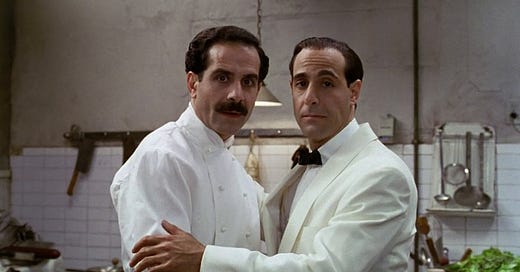Stanley Tucci’s Big Night (1996) - "The Best Restaurant Movie Ever"
To eat good food is to be close to God.
When Restaurant Week arrived at Featured Presentation, I knew the film the late, great Anthony Bourdain once dubbed “the best restaurant movie ever” had to be featured.
In 1996, then-burgeoning (now-renowned) actor Stanley Tucci decided to co-write, co-direct, and star in a film about two Italian immigrant brothers running a restaurant set in 1950’s New Jersey. The resulting film, Big Night, has been applauded for its astute portrayal of restaurant work, and a chef’s turmoil when their painstaking efforts in the kitchen go underappreciated.
During this era of American history, the gastronomic miracle that is Italian cuisine flew woefully over many a head. This lack of awareness around fine Italian cooking is exemplified just a few minutes into the movie when a patron turns up her nose at an expertly crafted seafood risotto and asks for a side of spaghetti and meatballs. Primo, the eldest brother and chef portrayed by Tony Shalhoub, can’t conceive of such a thing: Pasta with a side of pasta? “They are both a starch!” Primo cries, “She’s a philistine!”
Later, Primo tells his love interest about an exotic cream-based dish she’s never heard of before: lasagna. As the scene moves on, Primo explains his love for cooking. “To eat good food is to be close to God,” he sighs happily. This might as well be the thesis statement of the film. Sequences of cooking close-ups are consistently prioritized: Minutes of screentime are spent watching fresh pasta being rolled, sauces being stirred, and meats being seared. With a travel and food show on CNN, multiple cookbooks, and a TikTok boasting cooking videos with millions of views, Stanley Tucci is someone that I and many a gourmet trust to ensure Italian cooking techniques are accurately portrayed.
As the film kicks off, Tucci’s character Secondo conspires with a local competitor to bring the famous jazz musician Louis Prima to the restaurant in a last-ditch effort to drum up good press for their struggling business. Primo decides on the best dish for the evening: A timpano, a show-stopping pasta dish shaped like a drum that hails from Tucci’s family recipes back in Calabria.
As Primo begins to prepare the drum-shaped dish, more drums score Secondo’s journey across town, draining their savings and risking it all to prepare for the big night. Later, when the grand dinner finally commences, the sounds of dozens of pieces of silverware gently dancing around plates serve as symbols, crescendoing as a glorious new course arrives at the table. The clinking of wine and cocktail glasses score the earlier parts of the evening, and the drumroll makes its re-entry just as the magnificent timpano is served.
Until smell-o-vision and taste-o-vision are invented, food-loving filmmakers must craft more novel ways to stimulate the senses. To my ear, the prolific use of bare-bones percussion as score was Tucci’s and the other filmmakers' way of tantalizing the audience, priming our senses for the visual feast to come.
I would be remiss if I didn’t note that Shalhoub and Tucci’s acting is amplified by superb supporting performers, including Ian Holm, Isabella Rossellini, Alison Janney, Minnie Driver, and more. In the end, Louis Prima may or may not be coming to the big night, but the event is nothing short of star-studded.
Perhaps the most familiar moment to me was when the dinner guests bulged their eyes in disbelief when yet another mouthwatering “secondi” course arrived. That particular moment - when you feel utterly full but you realize you MUST make room in your stomach for the next glorious dish - is one I’ve been lucky enough to experience a few times, but I’ve never seen accurately put to film, until now.
At the end of the meal, we see a woman sobbing hysterically. “My mother was such a terrible cook,” she cries. By the time we see Primo and Secondo shuffling through handwritten recipes, we realize each of those recipe cards belongs in the Uffizi.
The movie goes from “solidly good” to “bravissimo” at the end of the night when Stanely Tucci’s character is forced to reckon with his identity: His brother is a great chef, his competitor is a successful restaurateur. Who, then, is Secondo?
Instead of answering the question with words, we see Secondo prepare a simple meal of eggs and leftover bread for his waiter and his brother. The scene plays out in one long shot, and the camera finally, miraculously begins to move when the brothers pat each other on the back. Secondo may be imperfect, but he is a champion, a gourmet, an appreciator of the finer things in life, and the ultimate supporter. Secondo is the type of person a great chef like Primo needs by his side.
Big Night may make its mark in food-cinema history by portraying a failing restaurant business, but Secondo knows that a damn great dinner makes it all worth it.






🗣️ TO EAT GOOD FOOD IS TO BE CLOSE TO GOD 👏 Thank you for letting me write about this essential Tucci lore!
I remember hearing about Big Night when it came out many years ago. Your essay has made me interested in looking it up again on a streaming platform. Thank you for that. There's a lot of junk to sort through on the streamers, and this type of essay helps curate the mess of media available.
Besides the love of fine cooking, it sounds like this film is about entrepreneurship and people being passionate about their work.
How do we get other people to pay attention to what we are doing?
If we love what we do and are extremely good at it, is that enough to get other people interested in what we do, even if it's different from what they're used to?
The way you've written your essay, it sounds like Big Night is also a book about leadership. I'll have to watch the movie to double-check, but Secondo sounds like the kind of self-sacrificing leader who puts his "team" first.
Your description of Secondo reminds me of the book The Captain Class, by Sam Walker. Walker looks at the greatest sports teams of all-time and identifies a "captain" from each of those dynasties. Rarely is the captain the best player on the team, and I'm curious to see if the traits Walker singles out in his book are the same traits that Secondo has in Big Night.
Cheers! Thanks for sharing your essay! I look forward to more reads about movies.